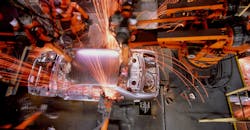Survey Says: Slow and Steady IoT Adoption Continues
The Eclipse Foundation, one of the world’s largest open source foundations focused on the Internet of Things (IoT), recently released the results of its first annual IoT Commercial Adoption survey. The objective was to gain a better understanding of the IoT industry landscape by identifying the requirements, priorities and challenges faced by organizations that are deploying and using commercial IoT solutions, including those based on open source technologies.
“The Internet of Things is clearly one of the major technology trends today and a ubiquitous buzzword,” said Mike Milinkovich, executive director of the Eclipse Foundation. “This survey, which we hope will be the first of an annual tradition, seeks to provide real insights into what organizations are doing with the IoT right now and their plans for production deployments.”
Notable results
● IoT is real and adoption is growing, if slower than the hype would indicate. Just under 40% are deploying IoT solutions today and another 22% plan to start deploying IoT within the next 2 years.
● Caution rules in the IoT market, with 30% of organizations planning to spend less than $100K in the next year.
● IoT investment is on the rise, with 40% of organizations planning to increase their IoT spending in the next fiscal year.
● Open source pervades IoT with 60% of companies factoring open source into their IoT deployment plans.
● Hybrid clouds lead the way for IoT deployments. Overall, AWS, Azure, and GCP are the leading cloud platforms for IoT implementations.
The survey data also includes details on IoT adoption by industry, top concerns by commercial IoT adopters, and breakdowns by organizational role.
Action items
Frederic Desbiens, the IoT and Edge program leader at the Eclipse Foundation tells IndustryWeek, the primary action item for manufacturers is they need to continue investing in IoT, as it's clear their competition is ramping their investment and actively exploring production deployments of this technology.
“Open source solutions should be a core component of their IoT architecture, since this will help ease interoperability and avoid being locked into a single vendor. Moreover, the market is evolving from piecemeal implementations to more comprehensive solutions,” he says. “Manufacturing organizations increasingly implement IoT solutions that tie industrial automation, asset management and logistics together; the most innovative of them also rely on IoT technologies to improve their customer value proposition by offering preventive maintenance features."
About the Author
Peter Fretty
Technology Editor
As a highly experienced journalist, Peter Fretty regularly covers advances in manufacturing, information technology, and software. He has written thousands of feature articles, cover stories, and white papers for an assortment of trade journals, business publications, and consumer magazines.
